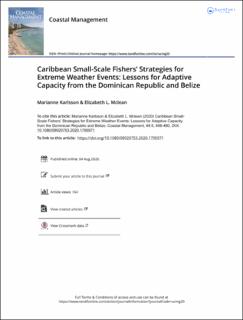Caribbean Small-Scale Fishers’ Strategies for Extreme Weather Events: Lessons for Adaptive Capacity from the Dominican Republic and Belize
Journal article, Peer reviewed
Published version
Permanent lenke
https://hdl.handle.net/11250/2764483Utgivelsesdato
2020Metadata
Vis full innførselSamlinger
- Journal articles [478]
Sammendrag
Understanding how Caribbean small-scale fishers can adapt to climate change is critical to sustaining coastal communities and livelihoods in the region. Fishers continuously adapt their practices to climate variability and recurring extreme weather events, such as hurricanes. However, it remains unclear how their “everyday” responses contribute to building their adaptive capacity for future changes and unpredictable extreme climate events. This paper identifies and analyzes strategies used by fishers in the Dominican Republic and Belize to deal with extreme weather events and climate variability. We draw on two separate case studies to identify their current autonomous adaptive strategies and explore how these align with broader dimensions of adaptive capacity. We find that fishers in both countries respond to changes and climate variability by relying on three strategies: (1) storing, saving and borrowing resources, (2) using experiential knowledge, flexibility and mobility, and (3) diversifying livelihoods and intensifying fishing. We show that fishers build their adaptive capacity on flexibility to sustain their livelihoods and on local knowledge to mitigate risk and damage from extreme weather events. The paper argues that the adaptive responses used by fishers in the Dominican Republic and in Belize can sustain their livelihoods but cannot enable a long term and transformative adaptation to ongoing and cumulative climate changes.

